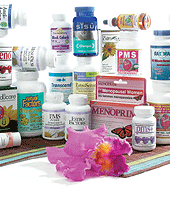Advertisement
Hormone Helpers
Hormones deliver a powerful punch. These tiny chemical messengers, secreted by the endocrine system, have huge impact on our mental, emotional, and physical well-being. Here’s an easy-to-use reference guide to some of the natural health products in your local health food store that help balance and strengthen hormonal functions. Ashwagandha (Withania somnifera), also called Indian … Continued

Hormones deliver a powerful punch. These tiny chemical messengers, secreted by the endocrine system, have huge impact on our mental, emotional, and physical well-being. Here’s an easy-to-use reference guide to some of the natural health products in your local health food store that help balance and strengthen hormonal functions.
Ashwagandha (Withania somnifera), also called Indian ginseng, is an adaptogen a therapeutic and restorative tonic that produces a balancing effect on the body by helping the body adapt to stress, including physical exertion, mental and emotional upheavals, and chemical exposures, with less negative effect. Studies show that ashwagandha supports all endocrine (hormonal) functions and acts as an antidepressant and mood stabilizer. The average recommended dosage is 80 mg standardized to 1.5 percent withanolides and 1 percent alkaloids taken two to three times daily.
B-complex vitamins, as found in a high quality multiple vitamin and mineral formulation, support all hormonal functions. For best results, select a multi with an average of 50 mg of each of the B vitamins.
Cleanse and detox programs that include a recommended eating program are essential to hormonal health. Regularly engage in an all-systems cleansing program to reduce your body’s load of hormone-mimicking compounds (xenoestrogens). Select a complete cleansing program from a reputable company.
Chromium GTF is a trace element that works with insulin to help transport glucose into cells. To regulate erratic blood sugar levels, take up to 1,000 micrograms daily.
Evening primrose oil, borage oil, and black currant oil are well-absorbed sources of gamma linolenic acid (GLA) that helps maintain hormonal balance. Women with PMS cherish this supplement because it helps control monthly symptoms of depression, mood swings, and breast tenderness. A study published in March 2000 by the International Journal of Cancer reported that GLA enhanced the effectiveness of drug therapy in treating women with endocrine-sensitive breast cancer.
Fermented soy provides easily assimilated phytoestrogens and isoflavones shown to protect against hormone-dependent cancers (breast and prostate). Two to three servings per day are recommended.
Flaxseed contains lignins, modulators of hormone metabolism. Grind flaxseed in a coffee grinder or blender. Eat one to two tablespoons daily.
Green tea (Camellia sinensis) is the darling of beverages. A January 2005 study by the University of Southern California Keck School of Medicine showed it reduced the risk of hormone-related breast cancer in post-menopausal women. Other studies showed it lowered insulin resistance and prevented insulin-induced body fat accumulation. Drinking several cups of a high quality green tea every day is recommended.
Iodine, from potassium iodide, iodized sea salt, fish, and sea vegetables, supports thyroid hormone production.
Omega-3 essential fats, in fatty cold-water fish (wild salmon, sardines, mackerel, and herring), fortified eggs, soy foods, flax, hemp seeds, and walnuts, help regulate hormone production and improve cellular response to insulin. In supplement form, the average recommended dosage is 1,000 mg three times daily.
Panax ginseng is the true ginseng. It is thought that ginseng’s action in the body is due to its stimulation of the hypothalamic and pituitary glands to secrete adrenal corticotropic hormone (ACTH), which affects many behaviours including motivation, physical and mental performance, and sexual arousal. Take 100 to 300 mg daily of a standardized extract.
Rhodiola rosea is an adaptogen that supports the adrenal glands. A double-blind study published in Phytomedicine (October 2000) found that rhodiola test subjects reported greater mental performance and less fatigue and stress. The recommended dosage is 100 mg standardized extract with minimum 3.5 to 4 percent rosavins and 4.5 percent salidrosides taken twice daily. Rhodiola is not recommended for women with a history of breast cancer.
Siberian ginseng (Eleutherococcus senticosus), also referred to as eleuthro, supports hormonal health as a tonic herb with adaptogenic properties. Eleuthro is especially effective in supporting the adrenal glands. Recommended dosage is 100 mg of standardized extract with a minimum of one percent eleutherosides taken two to three times daily.
Suma (Pfaffia paniculata) is frequently referred to in South America as “Brazilian ginseng.” An animal study published in the Journal of Reproductive Development (April 2003) reported a significant increase in sex hormone levels after consuming suma. Recommended dosage is 100 mg two to three times daily.
Schizandra chinensis berries come from a Chinese magnolia plant and have been found to support and maintain liver health, which, in turn, supports all hormonal functions. Schizandra’s long history of use in Chinese medicine and recent scientific analyses confirm this tonic herb promotes general well-being and enhanced vitality while it relieves the effects of stress and fatigue. Recommended dosages range from 200 to 800 mg daily.
Vitex agnus-castus, also called chasteberry, is used to normalize sex hormones in women. It can help alleviate both menopausal and PMS symptoms. Average dosage is 80 mg standardized extract taken once daily in the morning.
You’ll feel more energetic, mentally alert, sexually alive, and emotionally positive with these natural hormonal health products combined with a balanced whole foods diet, exercise, and stress management.




